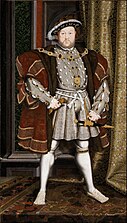Our website is made possible by displaying online advertisements to our visitors.
Please consider supporting us by disabling your ad blocker.
Divine right of kings
| Part of the Politics series |
| Monarchy |
|---|
 |
|
|
| Rights |
|---|
 |
| Theoretical distinctions |
| Human rights |
| Rights by beneficiary |
| Other groups of rights |
|
| Part of a series on |
| Integralism |
|---|
 |
In European Christianity, the divine right of kings, divine right, or God's mandation, is a political and religious doctrine of political legitimacy of a monarchy. It is also known as the divine-right theory of kingship.
The doctrine asserts that a monarch is not accountable to any earthly authority (such as a parliament or the Pope) because their right to rule is derived from divine authority. Thus, the monarch is not subject to the will of the people, of the aristocracy, or of any other estate of the realm. It follows that only divine authority can judge a monarch, and that any attempt to depose, dethrone, resist or restrict their powers runs contrary to God's will and may constitute a sacrilegious act. It does not imply that their power is absolute.[1]: 858
In its full-fledged form, the Divine Right of Kings is associated with Henry VIII of England (and the Acts of Supremacy), James VI and I of Scotland and England, Louis XIV of France, and their successors.
In contrast, the conception of human rights started being developed during the Middle Ages by scholars such as St. Thomas Aquinas (see Natural Law) and were systematised by the thinkers of the Age of Enlightenment, e.g. John Locke. Liberty, dignity, freedom and equality are examples of important human rights.
Previous Page Next Page




